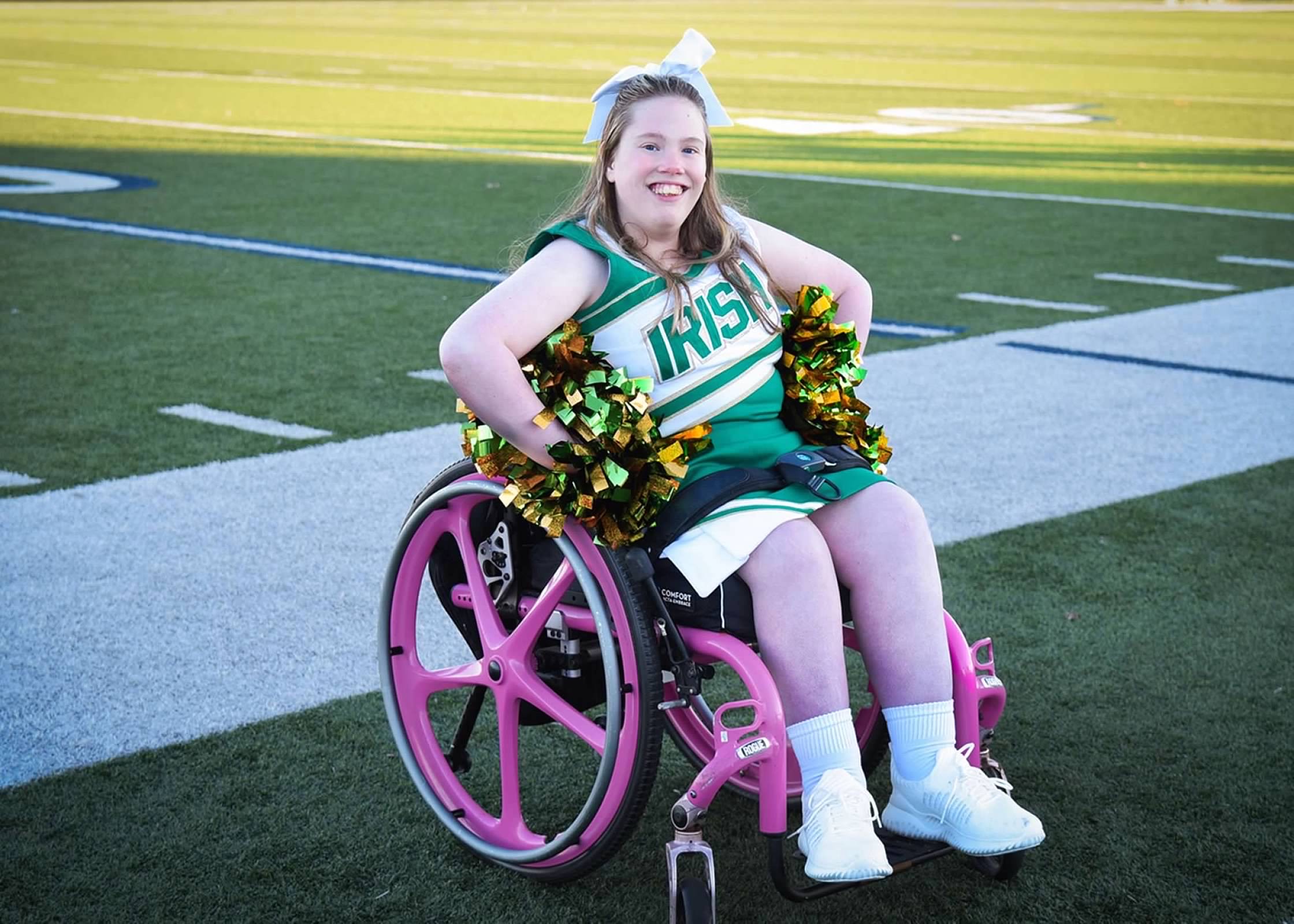By: Becki Uccello
August 26, 2024
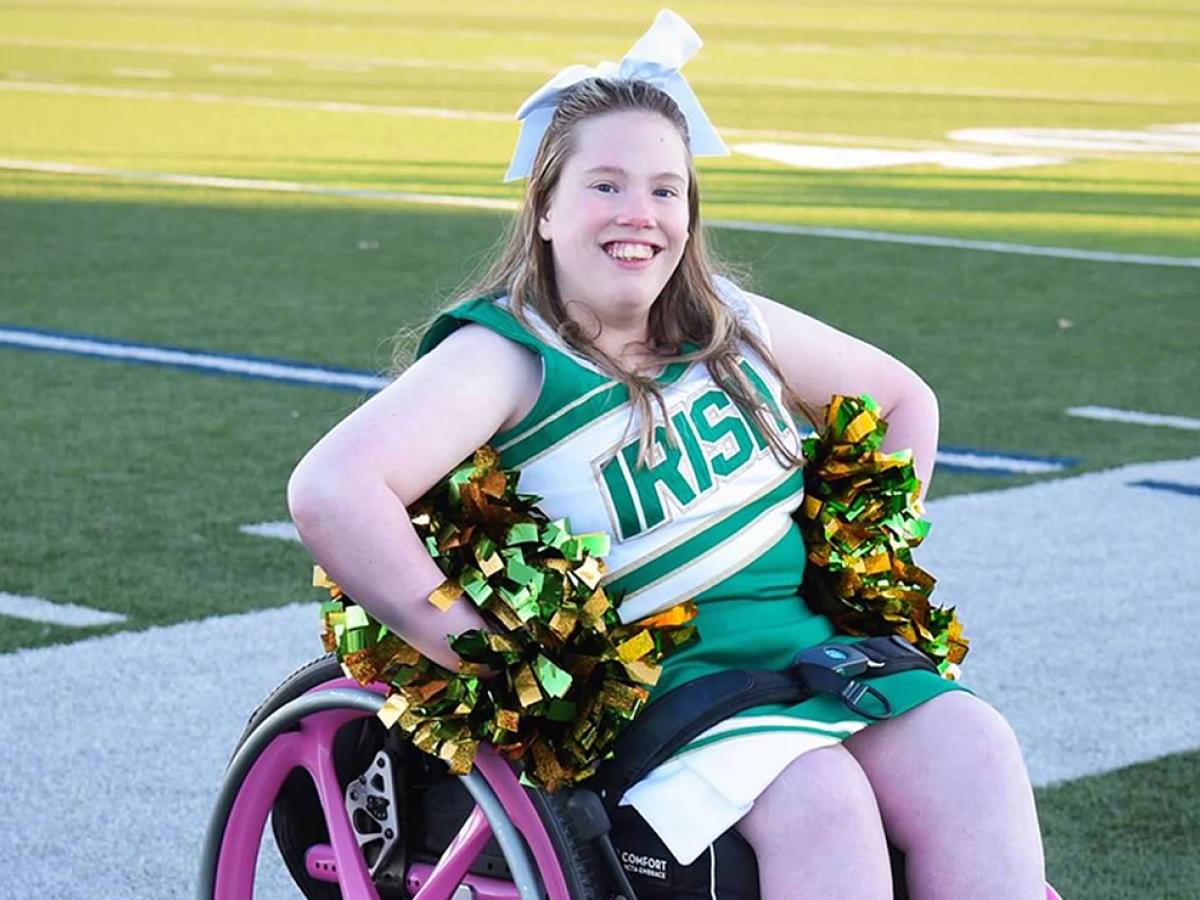
Fifteen years ago, I found out our daughter, Izzi, would be born with spina bifida, a congenital condition that leaves the spine underdeveloped.
If you told me then that we’d have a happy and healthy teenager about to enter eighth grade, I would not have believed it. Izzi is in such a good place, but it was a challenging — and amazing — journey to get here. If you’re lucky, like we have been, you find doctors who look beyond the diagnosis and truly see your child — doctors who don’t just treat your child’s health but also go out of their way to help your child be the best person they can be.
We didn’t have that kind of care in the beginning, and it took a major health scare for us to find it. When Izzi was just under a year old, she developed sepsis — a life-threatening situation that occurs when your body reacts badly to an infection. While it was a terrifying experience, it led us to Columbia and the doctors at MU Health Care’s Children’s Hospital.
For those first several years, we kept overnight bags packed by the door because we never knew if a check-up at the pediatrician would turn into a hospital admission. It was always this impending, “Are we going to be there overnight? Are we going there for two weeks? Whose taking which shift?” Columbia is nearly three hours away from our home in Springfield. Since Izzi has an older brother, time in the hospital split our family. We wanted one of us to stay home with him whenever possible because home was his safe place.
It wasn’t until after her third birthday that we stopped living in emergency mode and realized that the doctors in Columbia had gotten us over a hump. We were now beyond fixing the issues Izzi had at birth and instead focused on progressing forward to improve her quality of life.
Finding Our Footing as a Family
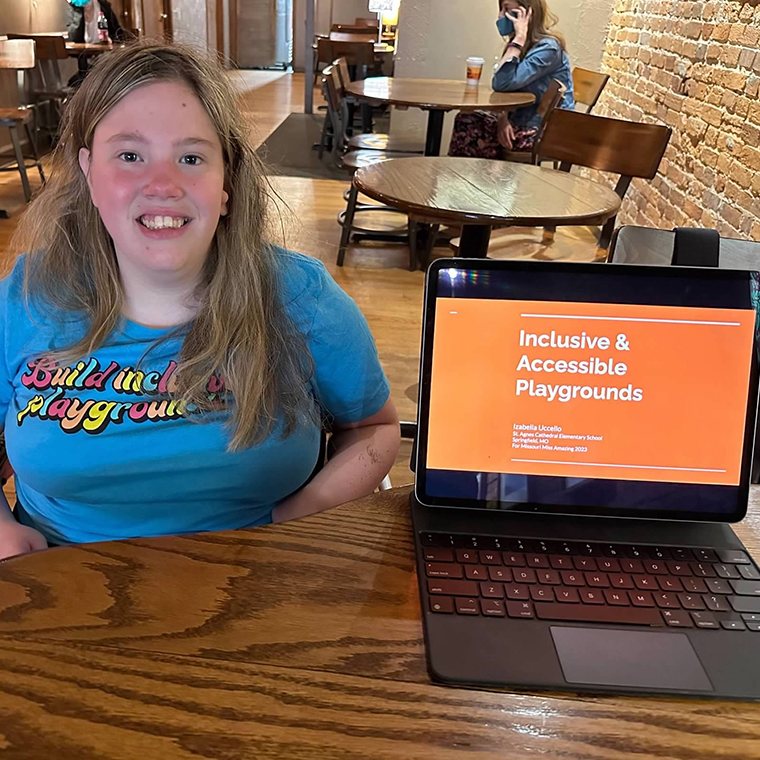
Finding doctors and care we trusted was a huge relief. But when you have a young child with a disability, you’re juggling a lot more than just the health care portion of things.
We struggled to get Izzi declared disabled as an infant, which is necessary to qualify for Medicaid. The medical bills piled up, and we lost our home and a vehicle and went through bankruptcy. When my husband, John, lost his job, I returned to work as a teacher, and he became a stay-at-home dad. It was a lot. So much so that at one point, someone even suggested we go through divorce because it would result in a better financial situation for our family.
It wasn’t until Izzi was 5, I realized I was depressed. I’d been holding feelings in because I didn’t want anyone to worry about me. It felt selfish to need help. And I didn’t want to be seen as a failure. But I’m fortunate to have a supportive husband and friends who pushed me to care for myself. It’s true when airlines say you can’t put a mask on someone else unless you put yours on first. I did what I needed to do to get back to better mental health, and I am a better mom to Izzi because of it.
In time, our family found our footing. John went back to school and is now a nurse. I’m no longer teaching — I focus my time on advocacy. I always assumed things would be accessible for Izzi and others in wheelchairs because of the Americans with Disabilities Act (ADA). But that hasn’t been our experience. I realized that people don’t always follow the law. Or they may be following the letter of the law but not the spirit of the law. I’m incredibly passionate about educational freedom and school choice so that children with disabilities can attend schools that provide the best support and opportunities.
Measuring Risk Versus Reward
One thing that remains constant over the years is our care at MU Health Care. We made the nearly three-hour drive monthly, then every three months and now we go once a year.
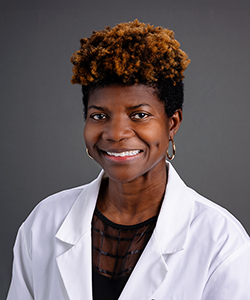
We’ve seen several doctors at MU Health Care for Izzi over the years, but we regularly see Dr. Elizabeth Malm-Buatsi, a pediatric urologist. Izzi is in a wheelchair and incontinent, and most of her ongoing issues revolve around her kidneys. For years, Izzi used a catheter and disposable underwear to empty her bladder and bowels, needing to be changed several times a day. We settled into a routine, but as she neared her preteen years, I worried incontinence was holding Izzi back.
Izzi lives a pretty normal life, hanging out with friends and busy with activities. But attending a sleepover was big on her bucket list. Dr. Malm-Buatsi told us about a procedure that could provide Izzi with some independence. The surgery would increase the size of her bladder and allow Izzi to use an abdominal catheter to create a regular bathroom routine — no more disposable underwear or needing to be changed.
We were hesitant because Izzi was healthy and happy. I had Googled and read stories, and a lot of parents thought this surgery would be their solution, but it didn’t turn out how they expected. I thought, “Do we want to put our child through all of this when right now, she’s healthy and everything seems to be working?” I wasn’t sure I was ready to disturb that balance and take the unnecessary risks that surgery brings.
Dr. Malm-Buatsi understood our concerns. She explained that just because this surgery can be done at an early age doesn’t mean it should be done then. But she also added that when we were ready, she believed the surgery could be a very successful experience. So, we waited until we thought Izzi was ready. Dr. Malm-Buatsi suggested we get her familiar with using a catheter since she’d be putting in her own catheter after the surgery. John poked a hole in one of Izzi’s teddy bears, and they practiced “cathing” the bear. Soon, Izzi walked through the process with her caregivers and Dr. Malm-Buatsi. She was ready.
A Life-Changing Surgery
I don’t think I’ll ever get over watching Izzi go through surgery — this one took 14 hours. But Izzi, who was 12 at the time, understood the surgery and could explain to people very clearly how the surgeons did what they did.
I’m used to doctors addressing concerns and moving on, but that’s not how Dr. Malm-Buatsi operates. She cares about more than Izzi’s kidneys and has shared the importance of mental health for people with spina bifida. She answers any questions John and I have, but she also gets on Izzi’s level. She wants to make sure she answers Izzi’s questions and hears what she has to say. I think that’s why Izzi is so comfortable talking about her health — we’ve all made it normal for her to be part of the conversation.
Once Izzi healed, she went to her first sleepover. I’m not sure how much I slept that night — there was a lot to worry about. I kept my phone next to me, but Izzi only texted in the morning to pick her up, and she was fine. In fact, she was thrilled that she finally had that experience with her friends.
Paying It Forward
In the two years since Izzi’s surgery, I’ve watched her thrive and embrace who she is and all that she has to offer. Dr. Malm-Buatsi gave her the courage to advocate for herself, and for years, Izzi’s watched me fight for her and kids like her.
She’s now found her own voice and passion, but my cause or “thing” is not her thing, as she likes to say. Izzi’s thing is advocating for inclusive and accessible playgrounds. The playground is where kids learn vital lessons and make friends, and every child needs to feel like they belong there.
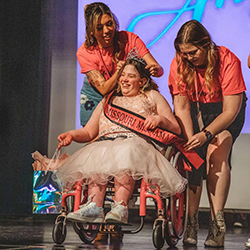
Izzi presented her passion project and explained the need for inclusive and accessible playgrounds to more than 1,000 people during a Miss Amazing pageant — part of a nationwide program for girls with disabilities. She’s talked to candidates for Missouri Attorney General. She has no problem speaking to any adult and sharing her story. I explained to her that being able to talk to people like this is a gift, and she has to do something with it. So she does.
I look back on our journey so far, and I’m so proud of Izzi and where we all are today. It took us a while to get here, and we didn’t do it on our own. We leaned on the support of family, friends and community. We trusted Izzi’s care to Dr. Malm-Buatsi and our team in Columbia. Like any parents, we’ve made mistakes along the way, but taking Izzi to MU Health Care isn’t one of them.
Next Steps and Useful Resources
- Want more stories like this? See how MU Health Care helps kids be kids.

